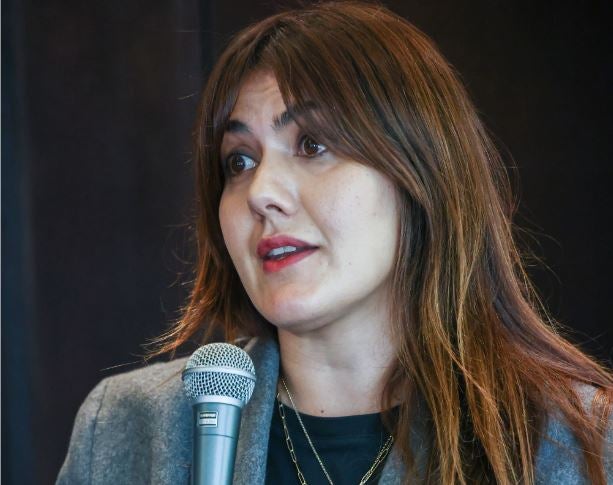
More is not always best when it comes to attracting paid subscribers to journalism.
This is the view of Farrah Storr, head of publisher partnerships at Substack UK, speaking at the Press Gazette Future of Media Trends event in London last week. She also said it is a mistake to see Substack as just a newsletter platform.
The former editor-in-chief of Elle UK said: “The best way to think about Substack is to see it as a media empire in the palm of your hand.
“We’re seven years old now and in that time we have reimagined what a newsletter can be. You can send a podcast, a voice note, a video — and yes, of course a classic written newsletter.
“I joined the company three years ago and it’s true that the majority of writers were very much looking for a classic written ‘column’-style newsletter. That’s still a hugely popular format by the way and there are lots of our biggest columnists who do it brilliantly: Ian Dunt, David Aaronovitch and more recently Jameela Jamil.”
She said one of the key benefits of the platform is it allows journalists to own their audience, and take it with them somewhere else if they wish by exporting their list of email subscribers. Other platforms, such as Twitter/X, are harder to monetise and keep ownership of the reader data.
She said: “Essentially Substack has allowed writers, creators and publishers to house everything in one place whilst also allowing them to own their audience. So many brands have spent years creating free content on social media platforms only to realise they don’t own the very audience they have spend years creating.
“On Substack you get to build a solid email list and make money from those who love the work you do. If I was still editing magazines today it would be a no-brainer to create something on Substack.”
Substack head of UK partnerships Farrah Storr: Publishers should let their reporters earn extra money from Substack
Asked whether readers have newsletter fatigue given the growing number which are available, she said: “I would say paid subscribers don’t always want more content, that’s one of the biggest learnings I’ve seen over time. What they want is intimacy.
“They want access to something you have never shared before, maybe a think piece about motherhood, maybe the books on your bedside table (a very popular thing to share).
“Maybe they want access to your community or a voice note you’ve sent them as you’re walking in the park. That might not sound so polished to some, but polish is not the point. Being real is the essence of Substack.”
Many high-profile journalists have left paid employment to set up their own paid-for newsletters (and some are now making more money by doing so). How does Storr think publishers can hang on to their brightest stars?
“As someone who was a magazine writer for years, I think a lot of journalists really want to stay working at their publishing houses. Being a writer on a magazine or paper is a wonderful job, but it’s precarious. I don’t know a single journalist working today who does not worry about the future of the industry.
“So why not let them have a Substack? They can earn some extra money, publish pieces they wouldn’t ordinarily publish on the day job and here’s the win-win: if they have a Substack, and you have as a publisher have a Substack, you’re both going to win, because there can be cross-pollination.
“I could imagine a model where somebody works four days a week and then the other day they’re allowed to work on their Substack and maybe publishers think about having a mutually beneficial share of that revenue.”
Storr publishes her own Substack called Things Worth Knowing which is a mixture of fashion, lifestyle and real-life stories. She describes it as “basically the sort of stuff I was creating when I edited Elle and Cosmo“.
Asked how she balances that with her day job, she said: “I do it all as a hobby. I do one thing a week, because that’s all I have time for. I write on a Saturday and publish Sunday morning. And astonishingly I make almost as much money as I did as an editor and it’s my side hustle. So that’s why it’s really powerful and I think people underestimate what people are willing to pay for.
“There are tens of millions of readers on Substack and millions of them have got their bank details in the system. So you are only ever one click away from somebody spotting your work in the Substack ecosystem (either through another writer recommending you or through our own social media vertical called Notes), and then becoming a paid subscriber.”
Asked how to turn a print magazine into a product on Substack, she said: “One of the things which translates very well is the old magazine format of ‘Ask Me Anything’. So you could say: ‘Hey, on Monday night between 7 and 8pm, the team will be on hand to answer your questions and if you are paid subscriber, you can ask a question and it will be answered.’
“Things like that are working incredibly well, but are a really low lift for the team.”
Are Gen Z opening newsletters?
“I tend to advise people not to get hung up on open rates,” Storr said. “If someone has chosen to be part of your Substack world then whether they are 18 or 80, they are going to open that email.”
Substack shares tips and insights for publishers here.
Email pged@pressgazette.co.uk to point out mistakes, provide story tips or send in a letter for publication on our "Letters Page" blog
